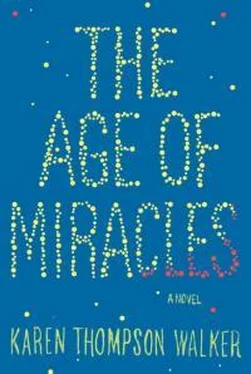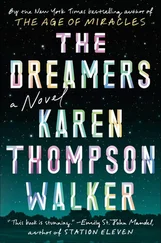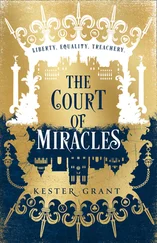She headed back out to the front porch. “Come on,” she said.
But I was tired of being with her. I went up to my room instead and lay flat on my bed for a while.
Twenty minutes later, the sun finally did slip behind the hill, proof at last that the earth, however slowly, continued to turn.
The wind reversed in the night and turned hard, blowing in from the desert instead of up from the sea. It howled and shrieked. Outside, the eucalyptus trees struggled and heaved, and the glittering stars showed that the sky was clear of clouds—this was an empty, stormless wind.
At some point, I heard the creaking of cabinets in the kitchen, the soft squeak of hinges. I recognized the shuffling of my mother’s slippered feet, the uncapping of a pill bottle, and a glass of water slowly filling at the sink.
I wished my father were home. I tried to picture him at the hospital. Maybe babies were being born into his hands right at that moment. I wondered what it might mean to come into the world on this of all nights.
Soon the streetlights flashed off, sucking the low glow from my room. This should have marked dawn, but the neighborhood remained submerged in the dark. It was a new kind of darkness for me, a thick country black, unseen in cities and suburbs.
I left my room and crept into the hall. Through the crack beneath my parents’ door, I could see the sickly blue light of the television leaking onto the hall carpet.
“You’re not sleeping, either?” said my mother when I opened the door. She looked slouchy and worn in an old white nightgown. Bouquets of fine wrinkles fanned out from her eyes.
I climbed into bed beside her. “What’s all that wind?” I asked.
We spoke in low tones as if someone were sleeping nearby. The television was on mute.
“It’s just a Santa Ana,” she said, rubbing my back with the palm of her hand. “It’s Santa Ana season. It’s always like this in the fall, remember? That part, at least, is normal.”
“What time is it?” I asked.
“Seven-forty-five.”
“It should be morning,” I said.
“It is,” she said. The sky remained dark. There was no hint of dawn.
We could hear the cats, restless in the garage. I could hear a scratching at the door and Tony’s persistent, uncertain wailing. He was nearly blind from cataracts, but I could tell that even he knew something was wrong.
“Did Daddy call?” I asked.
My mother nodded. “He’s going to work another shift because not everyone showed up.”
We sat for a long time in silence while the wind blew around us. The light from the television flashed on the white walls.
“When he gets home, let him rest, okay?” said my mother. “He’s had a very rough night.”
“What happened?”
She bit her lip and kept her eyes on the television.
“A woman died,” she said.
“Died?”
I’d never heard of such a thing happening under my father’s care. To die in childbirth seemed to me a frontier woman’s death, as impossible now as polio or the plague, made extinct by our ingenious monitors and machines, our clean hands and strong soaps, our drugs and our cures and our vast stores of knowledge.
“Daddy feels it never would have happened if they were working with a full staff. They were stretched too thin.”
“What about the baby?” I asked.
“I don’t know,” she said. There were tears in her eyes.
For some reason, it was right then and not earlier that I really began to worry. I rolled over in my parents’ bed, and the scent of my father’s earthy cologne wafted up from the sheets. I wanted him home.
On the television screen, a reporter was standing in a desert somewhere, the sky pinkening behind her. They were charting the sunrise as they would a storm—the sun had reached the eastern edge of Nevada, but there was no sign of it yet in California.
Later, I would come to think of those first days as the time when we learned as a species that we had worried over the wrong things: the hole in the ozone layer, the melting of the ice caps, West Nile and swine flu and killer bees. But I guess it never is what you worry over that comes to pass in the end. The real catastrophes are always different—unimagined, unprepared for, unknown.
At last, like a fever, the night broke. Sunday morning: The sky glowed a delicate blue.
Our backyard was littered in pine needles from the wind. A pair of potted marigolds lay overturned on the patio, the soil spilling from the pots. The umbrella and the lawn chairs had been strewn around the deck. Our eucalyptus trees stood listing and windblown. The dead blue jay remained unchanged.
In the distance, a wisp of smoke was puffing up from the horizon, floating quickly westward with the wind. I remembered then that this was fire season, too.
A news helicopter circled the plume like a fly. And it was reassuring to know that at least one crew had been assigned to cover this most ordinary of disasters.
After breakfast, I tried Hanna’s cell phone, but it just rang and rang. I knew it was different for her: Hanna’s life was noisy with sisters, her house a maze of bunk beds and shared sinks where the washing machine ran perpetually just to keep up with the dresses that piled each night in the laundry basket. It took two station wagons to carry her family away.
In my house, I could hear the floors creak.
By the time my father came home from the hospital in the late afternoon, the winds had calmed, and a low fog was rolling in from the coast, obscuring the slow motion of our sun across the sky.
“Had my headlights on the whole way home,” said my father. “Couldn’t see five feet in front of me in that fog.”
He looked exhausted, but it was a relief to see him standing in our kitchen.
He ate half a sandwich standing up. Then he cleared the counters of the dishes we’d left out the day before and wiped everything down with a sponge. He watered my mother’s orchids, and then he stood at the sink, washing his hands for a long time.
“You should get some sleep,” said my mother. She was wrapped in the same gray sweater she’d worn the day before.
“I’m too wired,” he said.
“You should lie down, at least.”
He looked out the window and surveyed the back deck. He pointed at the dead bird. “When did that happen?”
“Last night,” I said.
He nodded and slid open the drawer, where he kept a supply of surgical gloves for use in household jobs. I followed him outside.
“It’s a shame,” he said, crouching low near the bird.
A troupe of ants had discovered the body and were marching back and forth from the edge of the deck, descending deep into the feathers, and emerging with tiny bits of the bird on their backs.
My father flapped a white trash bag in the air until it snapped open and inflated.
“Maybe it’s because gravity changed,” I said.
“I don’t know about that,” he said. “Birds have always had trouble with our windows. Their eyesight isn’t very good.”
He stretched a surgical glove over each of his hands. A wave of rubbery dust floated off the wrist cuffs. I could smell the latex where I stood.
He closed one gloved palm over the bird’s rib cage, the wings sagging like tree branches as he lifted it into the air. Two black eyes the size of peppercorns remained motionless in its head. A few lost ants ran in frantic circles across my father’s wrist.
“Sorry about what happened at work,” I said.
“What do you mean?” said my father. He let the bird slip from his hand and into the bag. The sound was wet and echoey against the plastic. He blew on his wrist to get rid of the ants.
“A woman died, right?” I said.
Читать дальше












